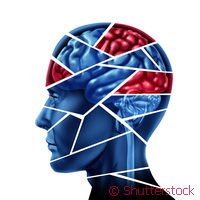Re-examining brain disorders
Brain disorders, including developmental, psychiatric and neurodegenerative diseases, represent an enormous burden in terms of human suffering and economic cost. Many brain disorders are chronic and incurable, and can be accompanied by disabilities that may continue for years or even decades. This means that the overall disease burden from these disorders is much greater than mortality figures alone would suggest. What's more, a recent study by the European Brain Council (EBC) predicted that the bill for disorders such as depression, anxiety, insomnia and dementia, will rise as people live longer, making it the number one economic challenge for European health care. Brain research is supported by the Seventh Framework Programme (FP7 2007-2013), which includes an activity on 'Research on the brain and related diseases' under the 'Health' theme. This activity has a particular emphasis on translational research, which means translating basic discoveries into clinical applications. In the first five FP7 calls, 39 projects were funded under this activity for a total of EUR 194 million. One of these project is the Psychosocial fActors Relevant to brain DISorders in Europe (Paradise). The objective of Paradise is to develop and test a new innovative approach by collecting clinical data on the psychosocial difficulties that people with brain disorders can experience. Although there is strong evidence that the overall personal, social and economic costs of brain disorders are high, these costs have been underestimated, the Paradise consortium believes. This is because of a lack of relevant data. These disorders have been defined in terms of diagnostic criterion which does not include a full range of psychosocial difficulties that actually shape the lived experience of persons with these disorders. Indeed, current European data on psychosocial difficulties are derived from the diagnostic criteria of each disorder and so take the form of narrow 'information silos' that are neither comprehensive nor comparable across disorders. Distinct information silos means that treatment planning, treatment evaluation and outcome assessment ignores commonalities of psychosocial consequences across disorders, undermining treatment efficiency and effectiveness, and ultimately increasing the costs of health and social care provision. The novel approach taken by the project is that these difficulties will not be linked to the specific diagnosis of the condition people have, but will be taken to be problems that people with very different brain conditions - the project looks at dementia, depression, epilepsy, migraine, multiple sclerosis, Parkinson´s Disease, schizophrenia, stroke and substance use disorders - all have in common. If this is in fact the case, then this new way of collecting information could profoundly change how health physicians organise and deliver services to people with brain disorders across Europe, improving their lives and life opportunities. So to test this approach, the project selected a representative and heterogeneous sample of conditions: dementia, depression, epilepsy, migraine, multiple sclerosis, Parkinson's disease, schizophrenia, stroke and substance dependency. Building on systematic literature reviews for each of the nine brain disorders, patient focus groups and interviews, and extensive input from clinical experts, Paradise has identified salient difficulties that are commonly experienced across a number of these conditions. This information has been used to build a draft data collection tool called the Paradise Protocol, which collects harmonised data with a coherent conceptual basis, generating comparable data across brain disorders. This tool has been used to construct a metric of psychosocial difficulties. Furthermore, the results confirm that psychosocial difficulties represent obstacles that individuals with these conditions confront in their lives - obstacles that limit their inclusion and full participation in society. The overall objective of the project is to create a protocol with 24 questions on psychosocial difficulties, from which a profile of patients can be generated and compared. The Paradise Protocol, along with the collected harmonised data, will provide input for a future European strategy on brain disorders. Fundamentally, the project has shown that what really matters to people with brain disorders is coping with psychosocial difficulties, such as mobility, joining in community activities or simply dealing with everyday activities. Many of these difficulties cannot be appropriately treated with purely medical interventions, but require complementary psychological and social interventions. The method used by Paradise should therefore lead to more effective intervention planning and management, and therefore to improved quality of life for those with brain disorders.For more information, please visit: PARADISE http://paradiseproject.eu/

